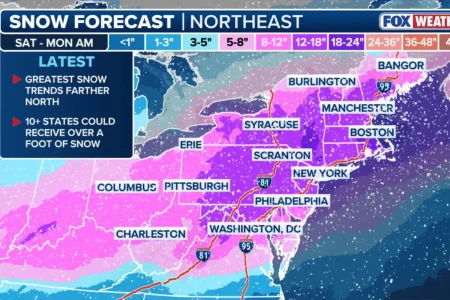Denmark Intensifies Military Posture Against Russia as Tensions Escalate in Northern Europe
Rising Concerns in the Baltic: Denmark Labels Russia a National Security Threat
In a significant shift in defense policy, Denmark has formally designated Russia as a direct threat to national security, marking a dramatic evolution in the Scandinavian nation’s strategic assessment. The declaration comes as part of Denmark’s comprehensive defense overhaul aimed at bolstering its military capabilities and reinforcing NATO’s northern flank. “The threat from Russia is real and increasingly concerning,” stated Danish Defense Minister Troels Lund Poulsen during a press conference in Copenhagen, where he unveiled the country’s updated defense strategy. “What we’re witnessing is not merely a temporary deterioration in relations, but a fundamental shift in the European security landscape that requires decisive action.” The minister emphasized that intelligence assessments point to Russia’s expanding military capabilities, increased activity in the Baltic Sea region, and what Denmark characterizes as “aggressive posturing” near NATO territories as key factors behind this formal recognition.
The Danish government’s announcement coincides with its commitment to meet NATO’s defense spending target of 2% of GDP, reversing decades of military downsizing following the Cold War. This investment will fund significant expansions in Denmark’s naval presence in the Baltic Sea, strengthening of air defense systems, and modernization of its aging F-16 fleet with new F-35 fighter jets. Political analysts note that this policy shift enjoys rare cross-partisan support in Denmark’s parliament, reflecting a widespread consensus on the changing security environment. “Denmark’s geographical position makes it a critical gatekeeper to the Baltic Sea,” explained Dr. Helena Jørgensen, a security studies professor at the University of Copenhagen. “This new posture reflects Denmark’s understanding that it sits at a strategic crossroads in what has become once again a contested region in Europe.”
Moscow’s Fierce Response: Russian Officials Condemn Danish Military Buildup
Russia has responded with sharp condemnation of Denmark’s security reassessment, with Kremlin spokesman Dmitry Peskov describing the Danish plans as “pure madness” and “a dangerous escalation driven by NATO’s expansionist agenda.” During a press briefing in Moscow, Peskov asserted that Russia poses no threat to Denmark or any Nordic country, characterizing the Danish position as “manufactured hysteria designed to justify unnecessary military spending and further NATO encroachment toward Russian borders.” The Russian Embassy in Copenhagen released a strongly-worded statement warning that Denmark’s military buildup “will not go unanswered” and could “destabilize the historically peaceful Baltic region.” The diplomatic exchange represents one of the most heated between the two nations since the Cold War era.
Russian Foreign Minister Sergey Lavrov further amplified Moscow’s position, suggesting that Denmark was acting as “a puppet of Washington” rather than pursuing its own security interests. “We see a pattern across Europe where reasonable diplomatic relations are being sacrificed on the altar of American geopolitical ambitions,” Lavrov told reporters during a visit to Belarus. Military analysts note that Russia has increased its naval exercises in the Baltic Sea in recent months, with Russian warships and submarines operating more frequently in international waters near Danish territory. “Russia sees the Baltic as vital to its strategic interests and access to the Atlantic,” explained Admiral (ret.) Viktor Sokolov, a former Russian naval commander, speaking to Russian state media. “Any attempt to turn this region into a ‘NATO lake’ will naturally prompt defensive countermeasures from Moscow.”
Historical Context: From Cold War Tensions to Modern Security Challenges
The deterioration in Danish-Russian relations represents a stark reversal from the post-Cold War period, when both nations worked to build economic and diplomatic ties despite historical differences. Throughout the 1990s and early 2000s, Denmark had been among the European countries advocating for greater engagement with Russia, supporting its integration into European economic structures and even collaborating on environmental initiatives in the Baltic Sea. Dr. Magnus Petersson, historian at the Norwegian Institute for Defense Studies, contextualizes the current situation: “What we’re witnessing is the collapse of the post-Cold War security architecture in Northern Europe. Denmark, like other Nordic countries, had gradually reduced its military capabilities after 1991, believing that conventional threats in the region had diminished permanently.”
This optimistic view began to erode following Russia’s annexation of Crimea in 2014, but the full-scale invasion of Ukraine in 2022 catalyzed a comprehensive reassessment across Scandinavia. “The Ukraine war shattered any remaining illusions about Russia’s intentions and capabilities,” explained Søren Espersen, former chair of the Danish Parliament’s Foreign Policy Committee. “What was once considered alarmist is now mainstream thinking in Copenhagen.” Denmark’s strategic reorientation has also been influenced by increased Russian activity in the Arctic and North Atlantic—regions of critical importance to Danish security interests, particularly given Denmark’s responsibility for Greenland’s defense. Maritime security experts point to incidents of Russian vessels operating near Danish undersea infrastructure and energy installations as additional factors driving Copenhagen’s hardened stance toward Moscow.
Regional Implications: Nordic Defense Cooperation and NATO’s Northern Flank
Denmark’s formal designation of Russia as a threat comes amid a broader realignment of Nordic defense policies, with Finland and Sweden abandoning decades of military non-alignment to join NATO—a historic shift that has fundamentally altered the strategic balance in Northern Europe. “We are witnessing the formation of a Nordic security bloc within NATO that will significantly strengthen the Alliance’s northeastern flank,” said NATO Secretary General Jens Stoltenberg during a recent visit to Helsinki. Denmark has been actively working to deepen military cooperation with its Nordic neighbors through joint exercises, intelligence sharing, and coordination of defense procurement. The Danish government recently signed a trilateral defense agreement with Norway and Sweden focused on integrated air defense and maritime security in the Baltic and North Sea regions.
The strengthening of Denmark’s military posture also carries significant implications for the Baltic states—Estonia, Latvia, and Lithuania—which have long warned about Russian threats. “Denmark’s recognition of the Russian threat validates what Baltic nations have been saying for years,” noted Latvian Defense Minister Artis Pabriks. “A stronger Danish military presence in the Baltic Sea provides crucial depth to regional deterrence.” The Danish naval base at Frederikshavn is being expanded to accommodate increased NATO maritime operations, while air defense systems at Karup Air Base are being upgraded to enhance surveillance capabilities across the Baltic region. Energy security has emerged as another dimension of this evolving security landscape, with Denmark taking measures to protect critical underwater infrastructure following the 2022 sabotage of the Nord Stream pipelines. “The security of energy infrastructure has become inseparable from traditional military security,” explained Danish Energy Agency director Kristoffer Böttzauw. “We’re dealing with hybrid threats that blur the lines between civilian and military domains.”
Analysis: The Future of Danish-Russian Relations in a New Era of European Security
Security experts are divided on whether the current trajectory of Danish-Russian relations can be reversed in the foreseeable future. “We’re looking at a generational shift in European security thinking,” observed Thomas Wegener Friis, an intelligence historian at the University of Southern Denmark. “Even if there were political changes in Russia, the trust has been so fundamentally broken that Denmark and other Nordic countries will maintain enhanced military readiness for decades to come.” The economic dimension of this deteriorating relationship should not be overlooked, as Denmark has historically maintained significant trade ties with Russia, particularly in agriculture, pharmaceuticals, and machinery. These commercial relationships have withered under sanctions regimes, with Danish exports to Russia falling by over 60% since 2022.
The potential for accidental escalation remains a concern for security planners on both sides. With increased military activity in the confined spaces of the Baltic Sea and more frequent encounters between NATO and Russian forces, the risk of miscalculation has grown. “What makes the current situation particularly dangerous is the absence of functioning communication channels and confidence-building measures that existed even during the Cold War,” warned Rear Admiral Nils Wang, former head of the Royal Danish Navy. Denmark has installed a direct military deconfliction line with Russian forces, but its effectiveness remains untested in crisis situations. As Denmark proceeds with its military reinforcement, the question remains whether these measures will ultimately enhance security or contribute to a self-reinforcing cycle of regional militarization. “The challenge for Denmark and NATO is to strengthen deterrence without triggering the very conflict they seek to prevent,” concluded Mikkel Vedby Rasmussen, Dean of Social Sciences at the University of Copenhagen. “This delicate balance will define Northern European security for years to come.”






